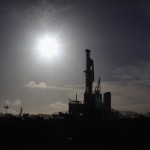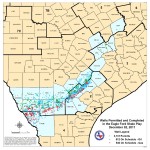How Fracking, Drilling and Earthquakes Are Linked

Photo courtesy of Dr. Frohlich
Dr. Cliff Frohlich of the University of Texas at Austin is researching the links between fracking and earthquakes.
StateImpact Texas intern Yana Skorobogatov researched and reported this article.
Enduring an earthquake is one of the least desirable ways to spend one’s New Year’s Eve, but that’s exactly what happened for many residents of Youngstown, Ohio. On December 31, 2011, a record-breaking 4.0 magnitude quake hit the midwestern town and left many residents understandably shaken up. It was the eleventh quake to disrupt the relatively sesimologically sound state that year, and partygoers weren’t the only ones affected.
The Ohio quakes were linked by officials and seismologists to disposal Injection wells used for storing fluid from hydraulic fracturing, or “fracking.” These wells go deep underground and can hold waste fluids from hundreds of fracking wells.
Could Texas, with it’s 216,000 active injection wells, be next? South Texas experienced a magnitude 4.8 earthquake in October 2011 near the Eagle Ford Shale Play, which is home to many disposal wells. There have been other earthquakes linked to injection wells in the Barnett Shale.
We recently sat down with Dr. Cliff Frohlich, Associate Director of and Senior Research Scientist at the Institute of Geophysics at the University of Texas at Austin, to learn more about the science behind artificially-induced earthquakes and figure out if Texas, too, is at risk.
Q: Can you give us a brief summary of the scientific community’s views about the possible connection between disposal wells and earthquakes?
A: In the scientific community, it was pretty much established in the 1960s that injecting fluids into the ground sometimes causes earthquakes. Prior to that, I don’t think people thought about it much. They had discovered that sometimes filling lakes will cause earthquakes. That was established in the 1930s when they built Lake Meade for the Hoover Dam. But in the 1960s there was a series of earthquakes in Denver that pretty much established this thought about fluid injection.
Q: There seems to be a common misconception that fracking causes earthquakes, but from what I’ve read, it’s the disposal of fracking fluid in deep wells that cause quakes. So what’s the difference between a fracking well and a disposal well, and why does one cause earthquakes while the other does not?
A: A year ago, I would have told you that fracking never caused earthquakes. However, in the last year there have three well-documented earthquakes that occurred during the frack job and were probably related to fracking. They were all small earthquakes – of a magnitude of 2 or 3 – and, considering, that there are millions of frack jobs, fracking-related earthquakes are so rare.
When it comes to injection, I probably only know of tens of (injection wells) them that have caused earthquakes. So from one point of view they’re not a problem because they’re rare. But injection causes earthquakes more often than does fracking. Fracking earthquakes are extraordinarily rare.
So what’s the difference? The usual model is that you’re injecting fluids that somehow get into a fault that’s stuck. So normally faults are stuck because of friction, but if you inject fluids the fault can slip…Now with fracking, the idea of it is that fluids don’t move very well, so you’re trying to bust up the rock. So the last thing a frack engineer wants is to have the fluids go through a fault and go somewhere. It’s like pouring water through a drain. So if you’re a frack engineer’s doing their job, they’re avoiding faults, and they’re trying to bust up area rather than having the fluids move somewhere. People injecting are less concerned about that. They’re trying to get rid of it, so they want a very porous material where fluids can flow away across long distances. So they’re more likely to get to a fault.
Q: Are the quakes happening in places that are already prone to seismic activity, or are injection fluids causing earthquakes to occur in otherwise stable areas?
A: So we generally think that [quakes happen where] there is already a fault that’s stressed, and injection allows it to slip, rather than causing it to slip from scratch. The misconception that the public might have is that earthquakes only occur in places like California. The truth is that there are little faults everywhere…There are faults that could slip, maybe this year or in 500,000 years, but again, they’re the same faults that are slipping in natural earthquakes.
Q: Do you believe that the induced earthquakes that we’re seeing now are happening more frequently?
A: The earthquakes are occurring more frequently now because there’s so much more fluid injection due to the fracking and the development of unconventional gas. This unconventional gas boom is huge. The Fort Worth basin covers 15 counties, and the Marcellus Shale covers vast portions of Pennsylvania, West Virginia, and New York. The Bakken Shale covers one-third of North Dakota. These have the potential to provide enormous amounts of energy. So what’s happened is that we have a lot more injection going on in a lot more places, where we’re producing more gas and earthquakes.
Q: Is Texas, with its 216,000 active drilling wells, as or more vulnerable to earthquakes due to injection welling as states like Oklahoma and Arkansas?
A: My research suggests that for the most part, earthquakes related to injection don’t get larger than the natural earthquakes in an area. In most parts of Texas the natural earthquakes are remarkably small. The biggest earthquakes in Texas, those in the western part of the state, were of a magnitude of 5.9…But most of the state has seen very low activity. So even though there are hundreds of thousands of injection wells, for the most part, I don’t see them posing much of a hazard in Texas. For other states that have larger natural earthquakes they could pose more of a hazard.
Q: Is Texas’ infrastructure retrofit in proportion to the earthquake risk it faces?
A: Every state, including Texas, can prepare better than they do for all kinds of disasters: cultural, economic, and natural. That said, I think Texas is correct in worrying more about floods and droughts and hurricanes than earthquakes. For the most part we don’t have a substantial hazard in Texas.
Read more on injection wells here and on the connections between drilling and earthquakes.
This interview has been edited for clarity and style.



